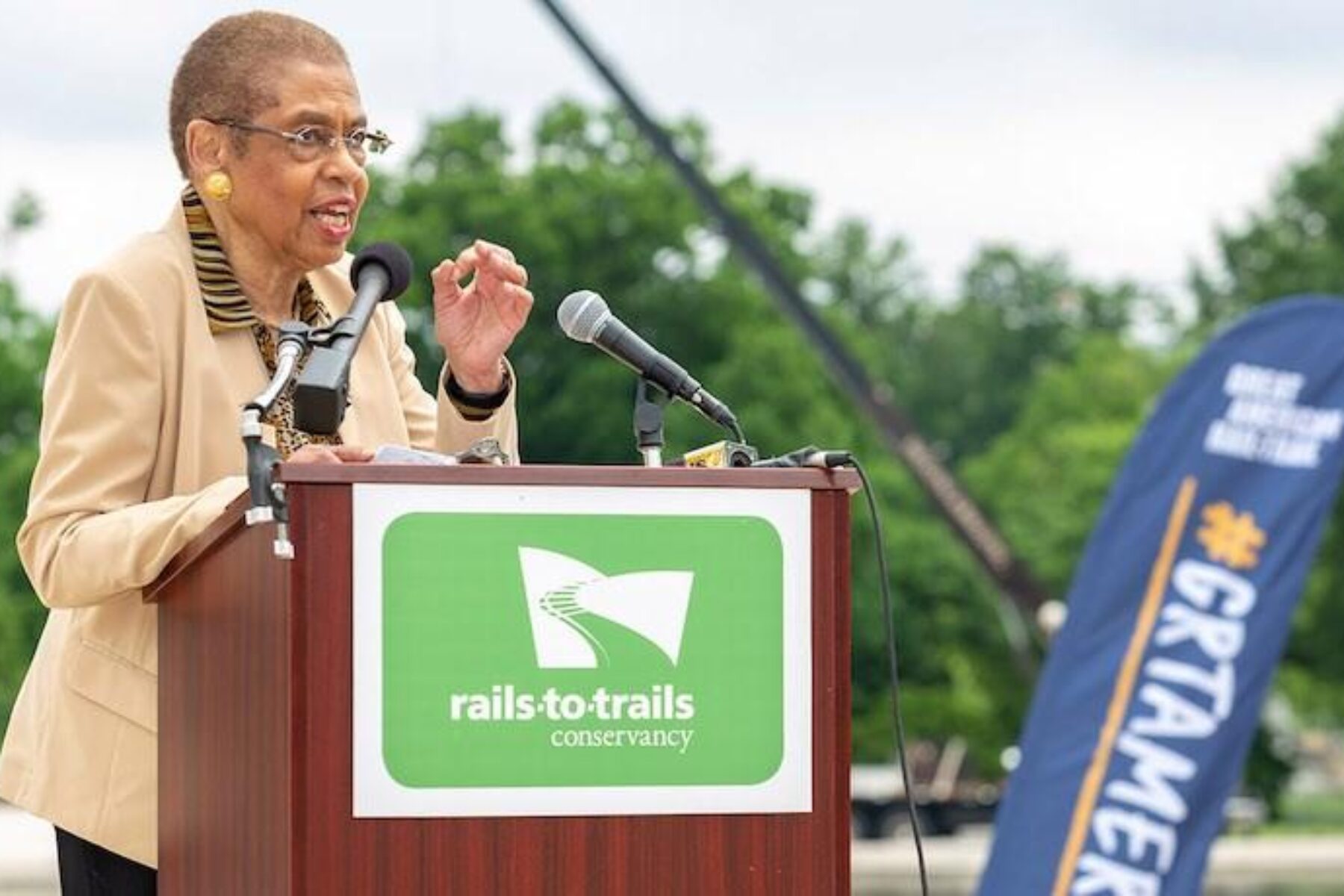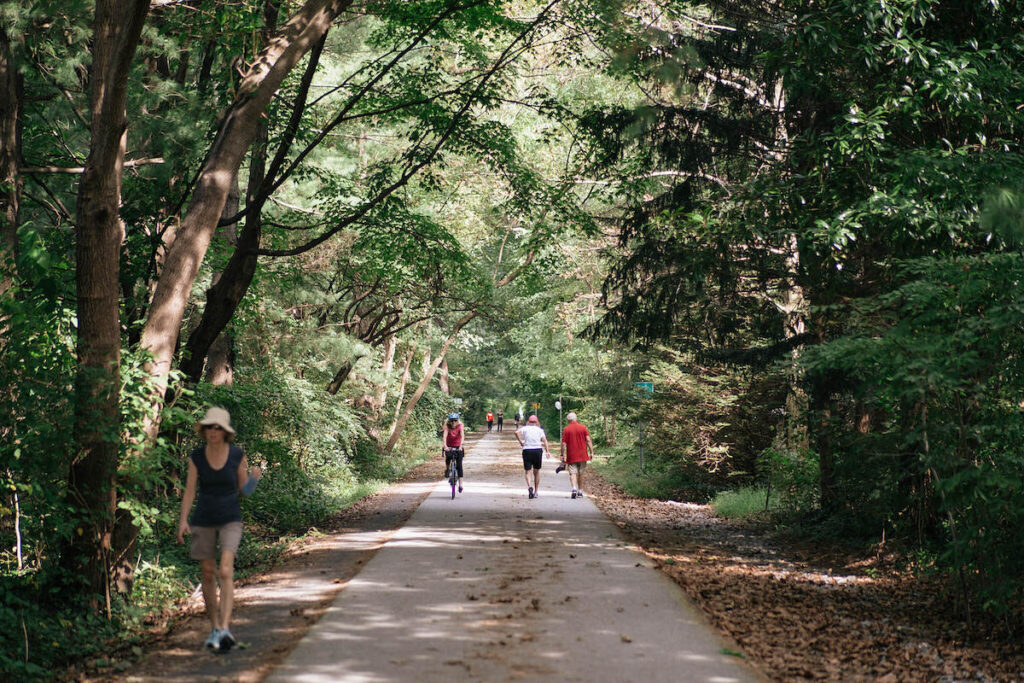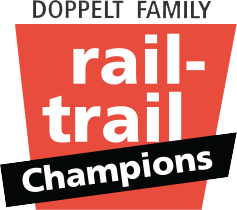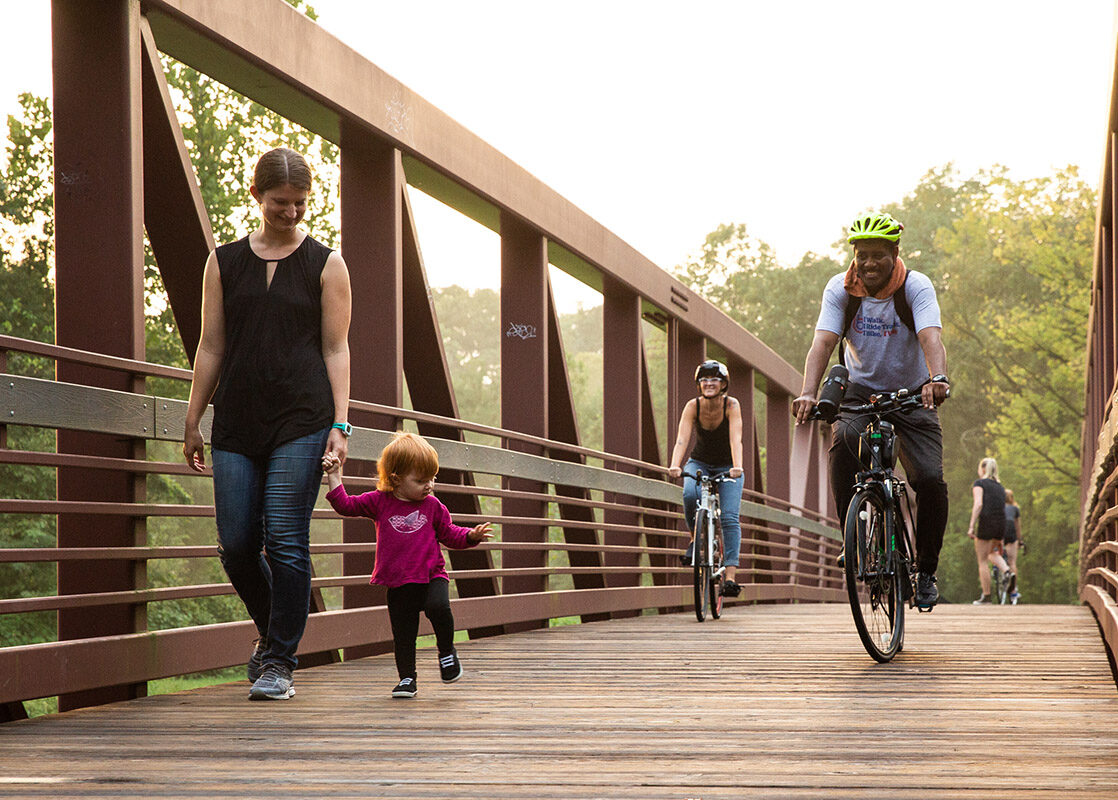Rail-Trail Champion Eleanor Holmes Norton on Linking the Nation by Trail

For her long-standing efforts to support trail networks in her native Washington, D.C., and across the United States, Rails-to-Trails Conservancy has named Rep. Eleanor Holmes Norton (D-D.C.) America’s 2020 Doppelt Family Rail-Trail Champion. Rep. Norton, a member of the U.S. House of Representatives’ Transportation and Infrastructure Committee and chair of its Highways and Transit Subcommittee, has been a major supporter of trails, walking and bicycling in Congress for decades, having consistently sought support for trail provisions in the transportation and infrastructure bills she’s led.
“I want to thank you very much for this recognition. It means a great deal to me to see that the work I’ve been doing consistently in Congress is appreciated, so I appreciate that.”
—Rep. Eleanor Holmes Norton
Among her most recent efforts is a bill passed by the House in 2020, H.R. 2, the Moving Forward Act, which includes transformative funding for active transportation and investments in walking and bicycling trails, as well as the first-time inclusion of Active Transportation Connectivity Grants.

In May 2019, Rep. Norton joined trail advocates on the National Mall to help announce the launch of the 3,700-mile Great American Rail-Trail™ connecting Washington, D.C., and Washington State—hailing the cross-country project she both believes in and legislates for.
“Now, we are well on our way to linking all of our trails across the United States—just as we have done in our highway system,” said Norton, who was a keynote speaker for the event. “That’s been my goal. We’re getting there.”
We were honored to video chat with Rep. Norton this past December about her efforts to help connect her city and the country by trail, and the vital need for trails in the midst of a pandemic, in the face of climate change—and every day. Here are some of the highlights [in an edited format] from our conversation.
In your role in the Highways and Transit Subcommittee, you brought significant influence to shaping the Invest in America Act. That bill included transformative investments in trails, walking and biking that were largely adopted when the Moving Forward Act was passed. When you think about that bill, what are you most proud of?
Well, I was particularly pleased that I was chair of the subcommittee this year that got one of the few bills out, the Highways and Transit bill. We call that bill Moving Forward. It’s H.R. 2, and that says something about the priority of the bill. I’m proud of the unprecedented provisions that allow for innovation in climate change. I believe that may be [one of] the most urgent problems facing our country and the world.
When you talk about transportation options, you talk about trails. Why do you think trails are important to a healthy transportation future?
Well, trails are critical, particularly today, to transportation. You heard me mention climate change … trails encourage other forms of transportation [like walking and biking]. They’re also, when you consider this pandemic, much needed, because they give us a way to be outdoors without close contact with one another. Trails are good generally, but they are particularly important when you consider what we’re going through now in our city and in our country.
The Moving Forward Act itself includes a lot of specifics about climate change. You have long been a champion for climate. How would you describe the relationship between the two?
Oh, the relationship is endemic now. Extreme weather events themselves can destroy trails. Here in D.C., we have seen more short-term, high-intensity storms. And we see that reflected in flooding in places like Rock Creek Park. Transportation is a leading cause of carbon pollution. If we want to keep our trails accessible, we have to deal with climate change and to build a clean transportation sector.
H.R. 2, the bill that I described earlier, requires states to establish a new greenhouse-gas emission performance measure. That’s the first time that’s been in a transportation bill. We provide over $8 billion to support carbon pollution reduction. We provide $1.4 billion for grants for electric vehicle charging. All of these are important tools to fight climate change and to maintain our trails.
D.C. has certainly asserted itself, with your leadership, as a leader in the trail movement, including as the eastern terminus for the Great American Rail-Trail. When you think about a trail of that scope, what do you think the real impact could be on the country?
I think it’s a way to incentivize more Americans to get outside and exercise. I’m cooped in, doing teleworking. I go for a half-hour walk every single day. It’s been snowing outdoors—I think it’ll let up enough for me to go even today. These trails, in the best of times and the worst of times, encourage getting out and exercising in a positive and healthy way. So they serve a purpose no matter what, and they particularly serve a purpose today.
What is your favorite trail in D.C., if you’re allowed to have one?
We have many trails that I’m proud of, like the Anacostia River Trail … I worked very hard on [that trail] and Kingman and Heritage Islands Park [along the trail on the west bank of the Anacostia River]. That’s a trail that most people weren’t much aware of at the footbridge of RFK Stadium. But if you ask me my own favorite, it would have to be Rock Creek Park, with its many trails. Remember, Rock Creek Park is so rare in a big city. Thirty-two miles of parks [and trails] right in the middle of the city. You can’t miss it. If you’re driving through the city, you’ll say, “Goodness, I’m going to get off to see what that’s all about.”
RELATED
The eventual 28-mile Anacostia River Trail is part of an effort by the Capital Trails Coalition to equitably connect 800 miles of existing and planned trails in the greater D.C. metropolitan area.

The Doppelt Family Rail-Trail Champions Award has honored 39 individuals around the nation who have made significant contributions to the rail-trail movement through their hard work, volunteerism or support—in short, people who have gone above and beyond in the name of trails.
This article appears in the upcoming Winter 2021 issue of Rails to Trails magazine. It has been reposted here in an edited format. Subscribe to read more articles about remarkable rail-trails and trail-networks while also supporting our work.

Donate
Everyone deserves access to safe ways to walk, bike, and be active outdoors.

